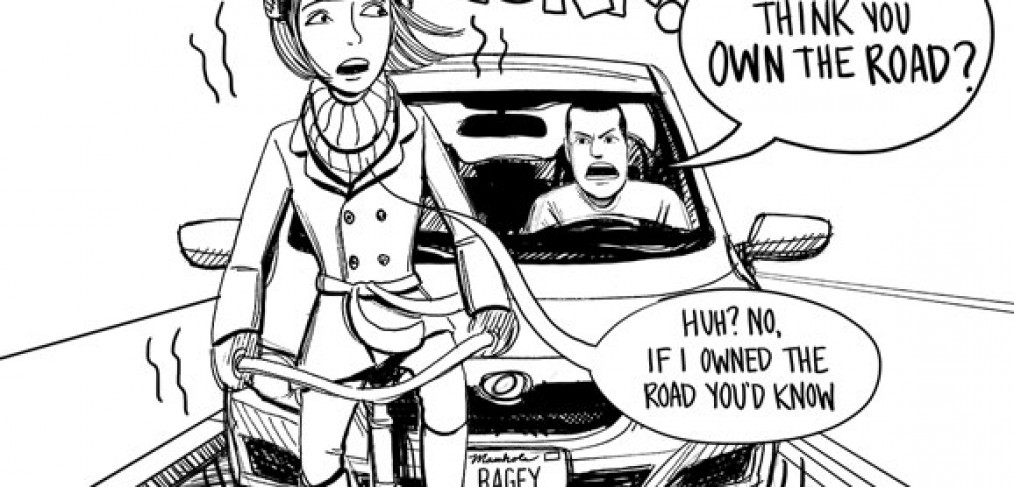
If I Owned the Road
Recently I found myself in this situation:
And I wished I could show this dude what would happen if I really did own the road. Things would be very different.
I wouldn’t have to take the lane ever again. People would have their roads back, and they’d be safer because…
Bad behavior wouldn’t be tolerated.
And parking wouldn’t be so free and flowing.
And that’s just the beginning.
No, drivers don’t realize how easy they have it. But, how about we make it a little easier for people?


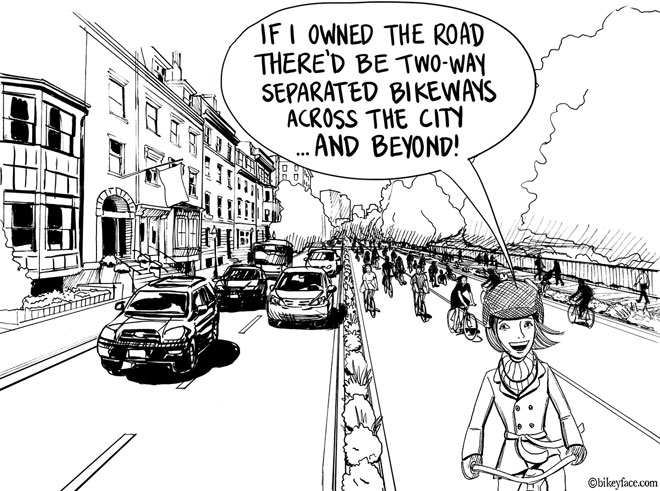
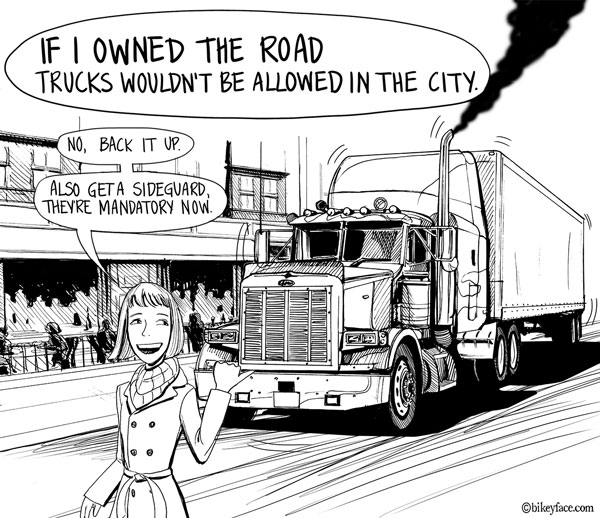
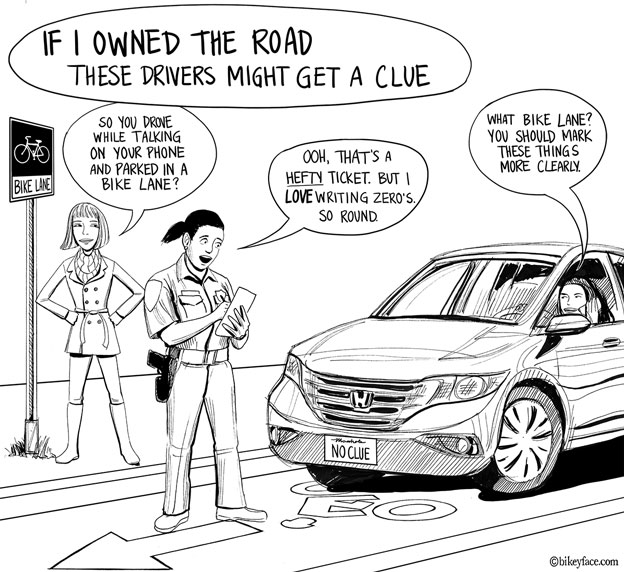
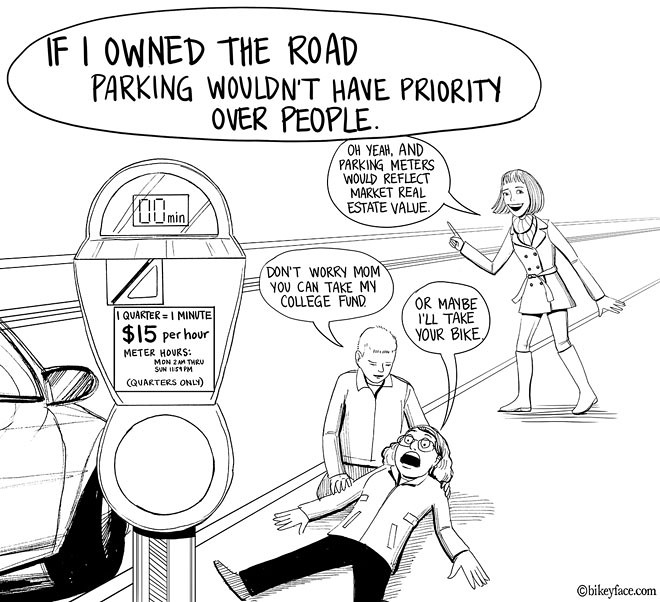

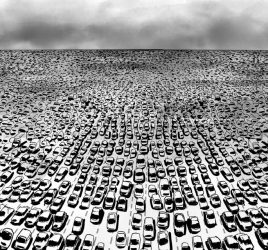
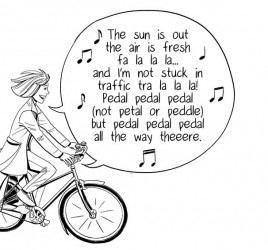
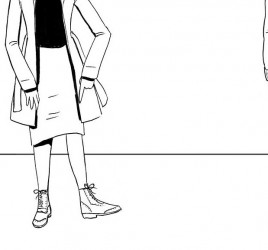
This looks like a blog of a person that failed driver licence test and has to use a bike.
Here I thought bicyclists DID own the road. They sure act that way, crossing lanes in front of cars, ignoring traffic signals and signs, weaving in and out of designated bike lanes. I know that not all of them are like that, just the same as not all drivers warrant the draconian ideas presented. I like the idea in first panel, every city should adopt this concept. Of course since it would benefit a specific group, that group would be tasked with paying for it, with hefty taxes on bike and bike accessory purchases, registration fees for bikes and licenses for bicycle riders. Also they would have to maintain insurance and pay for parking the same as motorized vehicles. And here’s an idea to keep trucks out of the city, how about you and a bunch of your friends unload the trucks at the city limit and bike the cargo to its destination?
You realize that “Share the Road” works both ways?
Erik,
You’ll get no argument from most responsible cyclists about the scofflaws. They give us all a bad name, and I am ashamed of them.
But I am a bit confused by your reference to paying for infrastructure. Motorists pay something in the order of 10-15% of the cost of constructing roads in the US, through gas taxes. Since the majority of the proceeds of gas taxes are spent on highways (which, of course, exclude bicycles), virtually the entire cost of building local roads is paid by taxes we all pay: income and sales. In addition, cars, with their vastly greater weight, do essentially all the damage to roads; you will not get a pothole from the impact of a bike tire.
So, we are **already** paying for roads. All we ask is that the same funding sources be used to construct cycle-friendly facilities.
Hmm, response. I’ll frame this as a comparison of destructive power. A cyclist has the destructive energy of a .22 Short round and is even less lethal than such a round. The current US average sedan has the destructive energy of an artillery round at normal street speeds where I live, varying between an 88mm on residential streets and a 155mm on arterials. Lethality varies from 5% at 20 MPH to ~100% (you get the occasional oddball survivor like me) at 50 MPH and above. And that’s just the family car at an average weight of 3700 lbs. Once you start getting to heavy trucks and the like lethality just goes off the scale. And that’s just one measure of why motor vehicles need to be taxed more and their operators kept to a higher standard.
The other issue is what motor vehicles do to roads, aside from taking up all the space. Making the unit of comparison a fat guy on a bike or a normal cargo bike loaded to about half its maximum load (in other words pretty much a worst-case scenario for the bike) we get the smallest and lightest vehicle currently on sale in the US does the same damage to the roads as 1100 bicycles, average does about 3000 bicycles damage, and your luxury SUVs hit the scales at just shy of 8000 bicycles of damage. A semi loaded to half the DOT limit GVW does 10,000,000 bicycles of damage, while a limit load 40 ton truck does… 160,000,000 bicycles of damage assuming the load is distributed equally on all 18 tires. And before someone points out my bicycle was probably delivered by a truck I would like to point out that is only because we have been systematically dismantled out rail freight system starting about the time we started building Interstate highways.
Damages were calculated using the latest AASHTO formulas for relative damage from the 2001 paper. Destructive energy calculated based on projectile weigh and muzzle velocity.
As someone who rides daily and year round…..
Grow up and stop complaining. Yes, there are crappy drivers. But roads were built for cars. Bikes and cars share them. Riding in the city is never going to be a Utopia for cyclists. Ride defensively and stop crying about cars, buffered bike lanes and everything else….
Most drivers are pretty good about having bikes around. But you’re never going to weed out all the idiots. Just like there are idiot cyclists.
No, roads were not built for cars. At least not in older cities. They were originally built for horses and carts. They only got to be good usable roads when the “Good Roads” movement was started by, guess who — cyclists! They were then used by trolleys, cyclists, etc. Repurposing for motorized auto and truck traffic occurred later. And the roads are in the process of being repurposed again, as things continue to change.
Tim is misinformed. The creation of roads was most certainly not made for cars. As Jon Webb stated the “good roads movement” was started by cyclists. It’s all right here:
http://en.wikipedia.org/wiki/Good_Roads_Movement
Some of these ideas are quite practical. It would not be technically difficult to make it impossible to text while driving. Cellphone towers “know” how fast someone is moving (because they get handed off from tower to tower). Change protocols so texts won’t work for the first x seconds after a cellphone starts using a tower and texting while driving disappears.
And almost no one is aware of how much damage heavy cars and trucks cause to roads. It is a fourth power law. So a car that weighs twice as much as another causes 16 times as much damage; a truck that weighs 10 times as much causes 10,000 times. Make registration fees and tolls proportionate to road damage and people would start choosing lighter, smaller cars fast, and long distance truck traffic would shift to rail.